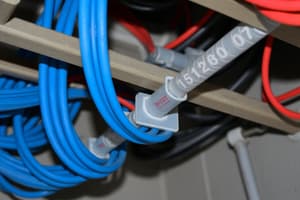Podcast
Questions and Answers
What is the primary function of an electrical conduit?
What is the primary function of an electrical conduit?
- To reduce the number of electrical wires in an installation
- To shield electrical wires from harm in exposed locations (correct)
- To connect electrical devices directly to the power source
- To increase the voltage of electrical wires
What type of electrical conduit is suitable for providing protection against impacts and significant damage?
What type of electrical conduit is suitable for providing protection against impacts and significant damage?
- Rigid metal conduit (correct)
- Electrical non-metallic tubing
- Rigid PVC conduit
- Flexible metal conduit
What is the main advantage of using rigid metal conduits with thick walls?
What is the main advantage of using rigid metal conduits with thick walls?
- To shield the cables from electromagnetic interference (correct)
- To increase the flexibility of the conduit
- To increase the current-carrying capacity of the wires
- To reduce the cost of the conduit
What is the purpose of galvanizing or coating RMCs with PVC?
What is the purpose of galvanizing or coating RMCs with PVC?
How many types of electrical conduits are commonly used?
How many types of electrical conduits are commonly used?
Which of the following is a non-metal conduit?
Which of the following is a non-metal conduit?
What is used to attach the conduit to the main tubes in a Rigid Metal Conduit (RMC) system?
What is used to attach the conduit to the main tubes in a Rigid Metal Conduit (RMC) system?
Why is it a good practice to use wiring with a grounding wire when using a Rigid Metal Conduit (RMC)?
Why is it a good practice to use wiring with a grounding wire when using a Rigid Metal Conduit (RMC)?
What is the most widely used variety of RMC?
What is the most widely used variety of RMC?
In what situations is aluminum with a PVC coating effective?
In what situations is aluminum with a PVC coating effective?
What is the primary advantage of rigid steel coated with PVC?
What is the primary advantage of rigid steel coated with PVC?
Why is it important to ensure the fittings used for an RMC are made of the same metal?
Why is it important to ensure the fittings used for an RMC are made of the same metal?
What is the primary application of standard FMC?
What is the primary application of standard FMC?
What makes IMC a popular choice in the construction industry?
What makes IMC a popular choice in the construction industry?
What makes LFMC resistant to corrosion?
What makes LFMC resistant to corrosion?
What is the primary difference between IMC and RMC?
What is the primary difference between IMC and RMC?
Flashcards are hidden until you start studying
Study Notes
What is an Electrical Conduit?
- An electrical conduit is a metallic or plastic pipe used to route electrical wires within an installation and shield them from harm when they are in an exposed location.
Types of Electrical Conduits
- There are seven common types of electrical conduits, divided into metal conduits and non-metal conduits.
Metal Conduits
- Rigid metal conduit (RMC): thick-walled, threaded, and usually composed of coated steel, aluminum, or stainless steel.
- Flexible metal conduit (FMC): a hollow tube created by coiling self-interlocking steel or aluminum strips.
- Intermediate metal conduit (IMC): a thinner and lighter variant of RMC, still applicable in RMC-like situations.
- Liquid-tight flexible metal conduit (LFMC): a unique type of flexible metal conduit with plastic covering and sealed fittings, waterproof and resistant to corrosion.
- Electrical metallic tubing (EMT): no details provided in the text.
Non-Metal Conduits
- Rigid PVC conduit: no details provided in the text.
- Electrical non-metallic tubing (ENT): no details provided in the text.
Rigid Metal Conduit (RMC)
- Attached to main tubes using screw connectors.
- Provides protection against impacts and significant damage due to its sturdy design.
- Can be used as a grounding conductor in short-run applications.
- Shields cables from electromagnetic interference due to its thick walls.
- Coated with PVC to prevent corrosion from water or other chemicals.
- Galvanized rigid conduit is the most widely used variety of RMC, suitable for commercial and industrial facilities.
- Aluminum with a PVC coating is suitable for situations where steel can be corroded by chemical vapors.
- Bronze alloy is effective in underwater, coastal regions, chemical facilities, and oil refineries.
- Rigid steel coated with PVC is resistant to corrosion from moisture, acids, alkalis, grease, and oils.
Flexible Metal Conduit (FMC)
- Offered in decreased wall thickness or normal wall thickness.
- Extra-flexible FMC is available for narrower radii, but must be UL certified.
- Frequently used in dry areas where it would be impractical to install a non-flexible conduit.
- Used in installations where it is desired to prevent vibrations from machinery from penetrating into another structure.
Studying That Suits You
Use AI to generate personalized quizzes and flashcards to suit your learning preferences.




